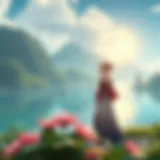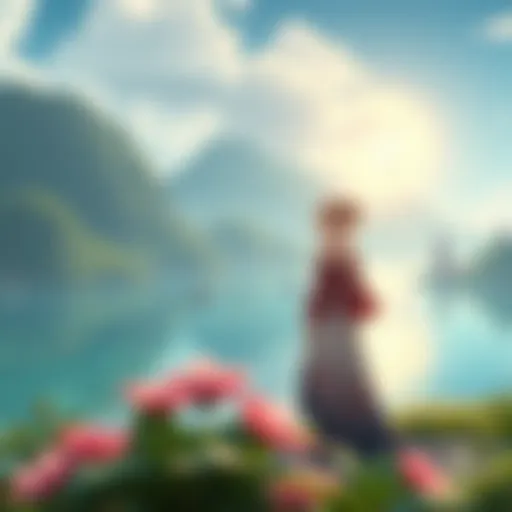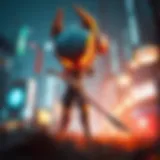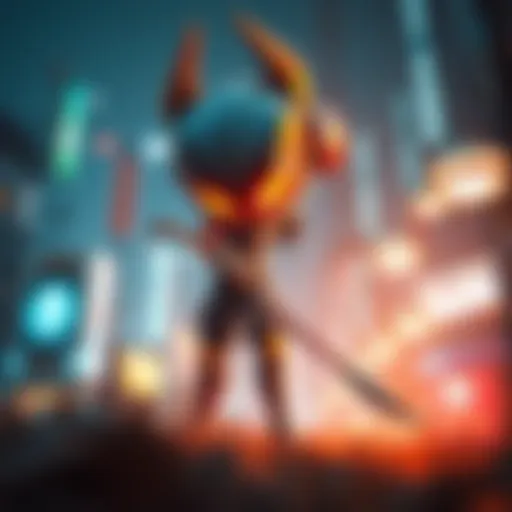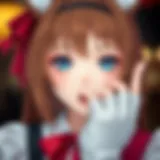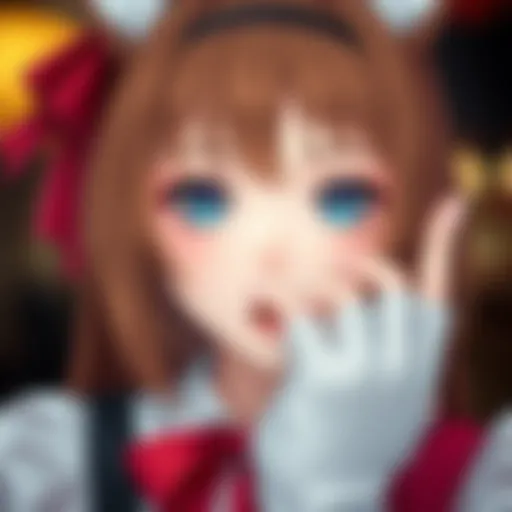A Deep Dive into the Hero Course of My Hero Academia
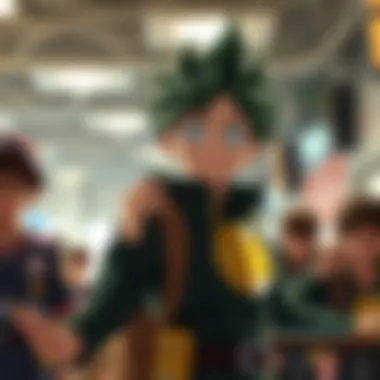

Intro
In the world of My Hero Academia, the Hero Course at U.A. High School represents not just a path toward becoming a hero but also a crucible that tests the very essence of its students. This exploration delves into the various facets of the Hero Course, revealing its critical role in shaping the narratives, character arcs, and ethical dilemmas found within the series. We will examine the challenges the students face, the guidance and mentorship they receive from experienced heroes, and the significant evolution the course has undergone within the storyline.
My Hero Academia isn't just an anime; it's a philosophical discussion wrapped in shounen tropes. As progressively we peel back the layers, the complexities of heroism come to light – scrutinizing the motivations, sacrifices, and implications that come with the title. By equipping ourselves with a deeper understanding of the Hero Course, we can better appreciate the broader themes and subtle undertones embedded in the anime's fabric.
Let’s journey through the depths of the Hero Course, engaging with its intricacies and significance.
Foreword to My Hero Academia
The world of My Hero Academia presents a vivid tapestry woven from threads of struggle, aspiration, and the intricacies of hero culture. This section serves as a gateway to understanding the series' significance, not just as a popular anime, but as a cultural phenomenon that resonates with themes of growth and determination. By delving into its foundational elements, readers will grasp why this series occupies a special place in the hearts of fans and serves as a reference point for contemporary storytelling in anime.
Overview of the Series
At its core, My Hero Academia explores a universe where the majority of the population possesses special abilities known as Quirks. Set in a society that venerates heroes, the narrative follows Izuku Midoriya, an ambitious boy born without a Quirk, who dreams of following in the footsteps of his idol, All Might. The series artfully mixes high-stakes action with profound character development, creating a compelling backdrop for its exploration of heroism.
Each character, from the tenacious Midoriya to the fiery Bakugo, brings their own personal struggles, making them relatable amidst their extraordinary circumstances. Their journeys through U.A. High School, particularly the rigorous Hero Course, shape them into potential defenders of society. The series poignantly illustrates the trials that come with aspiring to great heights while also examining the moral implications associated with power and the responsibility it carries.
Cultural Impact and Popularity
The influence of My Hero Academia stretches far beyond its animation and plot. It has sparked conversations across diverse platforms, drawing in fans of all stripes. Its reach has permeated the realms of social media, with insightful discussions and fan theories circulating on sites like Reddit, instigating lively debates among enthusiasts.
In Japan and beyond, My Hero Academia has surged in popularity thanks to its meticulously crafted characters and relatable themes. The series has fostered a vibrant community where shared experiences are celebrated, illustrating the artful storytelling that resonates with viewers' own journeys. For those exploring the intricacies of hero training and the responsibilities that come with it, the series acts as both a mirror and a guide. Educators and psychology enthusiasts alike have noted its potential as a tool for discussion about ethics and personal growth.
Understanding the Hero Course
The Hero Course is the backbone of My Hero Academia, serving as a critical foundation for the narrative and character development throughout the series. Understanding this course illuminates not only the rigorous demands placed on aspiring heroes but also reflects the broader societal and ethical questions at play. From the moment a student steps into U.A. High School, they are thrust into a world that parallels real-life challenges faced by professionals in any demanding field. This journey mirrors the complexities of personal growth, camaraderie, and moral dilemmas that weigh heavily on those who hold power.
Defining the Hero Course
At its core, the Hero Course is designed to transform students into competent heroes capable of safeguarding society. It is far more than mere physical training or mastery of unique abilities called "Quirks." The program encompasses.
- Academic Excellence: Students must grasp various subjects, from combat strategies to ethical decision-making, emphasizing the need for intellect as much as strength.
- Physical Fitness: Rigorous fitness regimens push students to their limits, ensuring they are ready for real-world scenarios.
- Teamwork and Collaboration: Many exercises are designed to foster teamwork, showcasing that heroism is seldom a solo endeavor.
With such a robust framework, the Hero Course prepares students for multifaceted challenges. It instills not only the necessary skills but also emphasizes the personal growth essential for such roles.
Historical Context within the Series
Examining the historical context of the Hero Course within My Hero Academia reveals how its structure has evolved in response to both narrative needs and character development. Initially, the course was a direct response to a society that had begun to grapple with the emergence of Quirks among the populace, shifting the role of a hero from a glorified figure to a societal necessity.
In the earlier arcs, the series reflects a time where heroes like All Might symbolized hope and aspiration. As the story progresses, the Hero Course adapts, mirroring the changing landscape of society and the increasing complexity of villains. The U.A. High School's curriculum responds to these dynamics, integrating lessons learned from past conflicts into its training methods.
- First Generation: When heroes were few, the Hero Course primarily focused on developing physical skills and basic Quirk control.
- Modern Era: With new threats emerging, the curriculum now incorporates advanced tactics, ethical discussions, and crisis management techniques, ensuring students are prepared for not just the battles they'll face but the moral implications of their victories.
Understanding this historical context enriches how viewers interpret character decisions and plot developments. It offers a window into the philosophy of heroism that permeates the series, illustrating how the world of My Hero Academia is as much a reflection of our own societal challenges as it is a work of fiction.
"Heroism is not just about strength or powers; it's about the choices made and the values upheld."
As we delve deeper into elements like the curriculum, mentorship, character arcs, and moral challenges in the upcoming sections, a comprehensive understanding of the Hero Course becomes essential. This course is a microcosm of the struggles and growth that define the hero's journey in My Hero Academia.
Curriculum and Training Regimen
The curriculum and training regimen of the Hero Course in My Hero Academia is central to understanding how the next generation of heroes is shaped. This aspect of the series not only showcases the educational framework but also emphasizes the intense commitment required from aspiring heroes. The combination of academic lessons and physical training cultivates a well-rounded hero, prepared to tackle various challenges.
Core Subjects and Skill Development
In the Hero Course, core subjects lay the foundation for a student's journey toward heroism. Unlike traditional education that focuses on rote memorization, the curriculum infuses practicality and applicability. Subjects include not only combat techniques but also ethics, law enforcement strategies, and emergency management.
- Heroic Theory: This subject dives deep into what it means to be a hero, encouraging students to reflect on their motivations and aspirations.
- Quirk Studies: Understanding the science behind quirks is crucial. Students analyze different quirks, exploring their strengths and weaknesses. This also lays groundwork for developing their unique abilities in novel ways.
- Physical Education: Physical fitness cannot be stressed enough. Training sessions are rigorous and require both endurance and strength, teaching students how to utilize their strengths in the field.
The overall objective of these subjects is to build a solid skill set while encouraging personal growth. Heroes are often judged not just by their abilities but also by their character. Hence, ethical training becomes equally important, guiding students in making morally sound decisions in critical situations.
Practical Exercises and Quirk Application
Practical exercises in the Hero Course offer a hands-on approach that is essential for real-world application of skills. Here, students utilize their quirks in controlled environments, gradually learning to harness their powers efficiently.
Typically, students participate in:
- Mock Battles: These provide opportunities to strategize against opponents, fostering teamwork and quick decision-making.
- Rescue Exercises: Simulated disaster scenarios challenge students to apply their learned theories in urgent, real-time situations. This not only tests their physical ability but also their mental acuity under pressure.
- Internships: The course incorporates internships with professional heroes, giving students a closer look at hero work. This experience allows them to understand the ethical and moral implications of decision-making in a real-world context.
Through these practical exercises, students learn to embrace the unpredictable nature of heroics. They evolve from mere students to fully-fledged heroes capable of making split-second decisions that can mean the difference between life and death for civilians.
"In the heat of battle, knowing one's Limitations is as important as knowing one's strengths."
This encapsulates the essence of the training regimen. In summary, the curriculum strives to equip future heroes not just with skills but also with the mindset and moral grounding necessary for an unpredictable and often dangerous profession. The meticulous balance between theoretical knowledge and practical application lays the groundwork for an effective hero in any scenario.
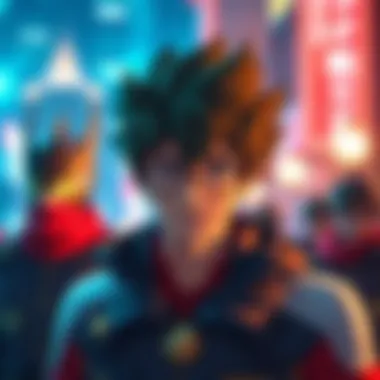

The Role of Pro Heroes as Mentors
In the realm of My Hero Academia, the concept of mentorship goes beyond mere guidance; it is a crucial element that molds the future heroes of society. The presence of Pro Heroes as mentors in the Hero Course serves not just an educational purpose but also fosters emotional growth and resilience among students. Their experiences, both triumphs and failures, become invaluable tools that students can use to navigate their own paths to becoming heroes. Different heroes bring unique skills and perspectives, ensuring that students receive well-rounded training that can significantly impact their effectiveness in the field.
Mentorship is an avenue where theory meets practice, where idealistic aspirations collide with the harsh realities of heroism. This dynamic relationship greatly influences character development in the series, as students often find themselves reflecting on the lessons taught by their mentors.
Influential Mentors and Their Impact
The mentors in My Hero Academia are pivotal figures, shaping the trajectory of their trainees. Characters like All Might and Eraser Head exemplify the profound influence that Pro Heroes can have.
- All Might, the Symbol of Peace, not only provides physical training but also instills a sense of hope and courage. His optimistic approach acts as a morale booster for students, pushing them to tap into their potential. This hero embodies ideals that students aspire to emulate, serving as a living testament to the values of heroism. His catchphrase, “It’s not the face that makes someone a hero, but the choices they make,” resonates deeply with aspiring heroes, encouraging them to embrace their individuality.
- Eraser Head, on the other hand, offers a more realistic view of what it means to be a hero. He emphasizes strategy and pragmatism, teaching students that raw power isn’t everything. He challenges them to think critically about their abilities and the ethics of using their quirks.
Moreover, these mentors provide emotional support. Heroes in the series frequently share personal stories of struggle, failure, and growth, which serve to humanize them. This sharing makes the students feel less isolated in their journey, knowing that even their mentors were once in their shoes.
Mentorship Styles and Relationships
The relationships formed between Pro Heroes and their students are diverse and reflect different mentorship styles. Each style carries its own nuances, contributing to the overall dynamics of the Hero Course.
- Authoritative Mentorship: This is characterized by a mentor who leads from the front. Think of characters like Gran Torino. He embodies this style, training students rigorously and expecting high standards. The relationship can often feel intense but remains focused on discipline and skill.
- Supportive Mentorship: This is more about encouragement and emotional guidance. Characters such as Mei Hatsume take on this role, allowing students to express creativity while providing support when they stumble. Her style emphasizes nurturing innovation without the weight of excessive expectations.
The overall mentorship landscape is constantly shifting in response to the students’ needs. These relationships can create powerful bonds, allowing students to communicate openly about their fears and aspirations. As a result, these young heroes not only develop professionally but also personally, learning about trust, accountability, and the importance of human connection.
As students journey through the Hero Course, the wisdom imparted by their mentors shapes their character, fostering resilience and a nuanced understanding of what it means to be a hero.
"A true hero isn't measured by the size of their power, but by the power of their heart."
This notion resonates through the entirety of My Hero Academia, rooting the significance of mentorship deeply into the narrative. Understanding these relationships and their impacts is essential for anyone looking to grasp the full essence of the Hero Course.
Character Development and Growth
Character development and growth is a cornerstone in the narrative structure of My Hero Academia, particularly within the framework of the Hero Course. This concept is not just about how characters evolve their abilities but also how they navigate personal struggles, moral dilemmas, and relationships with peers and mentors. Throughout their training, students undergo transformative experiences that ultimately shape who they become as individuals and as heroes.
The Hero Course is designed to push students to their limits, testing not only their physical capabilities but also their emotional and mental fortitude. By facing various challenges, students learn the importance of resilience, teamwork, and the true essence of heroism. This comprehensive guide aims to explore essential character arcs, development strategies, and significant hurdles that shape these future heroes.
Key Character Arcs within the Hero Course
Character arcs are pivotal in adding depth to the storyline. In the context of the Hero Course, several arcs stand out, showcasing the distinct paths students take.
- Izuku Midoriya: From a quirkless boy to a formidable hero, Midoriya's journey illustrates perseverance and growth. His initial encounters with failure motivate him to refine his skills and develop a unique approach to his quirk. This evolution represents not only his physical growth but a profound emotional one as well.
- Shoto Todoroki: Struggling with an identity divided between his father Endeavor's legacy and his mother’s influence, Todoroki’s character arc depicts the conflict between expectations and personal desires. His journey to not only control his incredible power but also come to terms with his familial ties offers depth to his character.
- Ochaco Uraraka: Uraraka’s growth focuses on confidence and the fear of inadequacy. Her desire to help her family through heroism propels her development, allowing her to overcome her self-doubt and find her unique place within the team.
These arcs are not merely for entertainment; they reflect the psychological growth and moral considerations inherent in the journey of becoming a hero.
Challenges Overcome by Students
The journey to becoming a hero is fraught with challenges that test students’ resilience and dedication. Within the Hero Course, students face numerous obstacles, each significant in their character development.
- Competitive Nature: The rigorous environment instills a sense of competition that can lead to self-doubt or drive for improvement. Students like Midoriya learn to navigate their fears of failure while pushing their limits.
- Moral Dilemmas: As heroes in training, students often encounter ethical decisions that reveal their true character. These moments compel them to reflect on their values and the responsibilities that come with power. For example, when faced with rescue scenarios, students must prioritize lives over personal ambition.
- Interpersonal Conflicts: Challenges in relationships, particularly with mentors and classmates, contribute to personal growth. Such interactions often force characters to confront their weaknesses, leading them to develop empathy and collaboration skills necessary for teamwork in the field.
These hurdles sculpt the students into more capable and responsible characters, ready to take on the trials of being a hero. This growth is fundamental to the larger themes of the series, emphasizing that heroism is as much about personal growth as it is about physical ability.
"The mark of a hero isn’t just how powerful they are, but how they face their greatest fears and still rise to the occasion."
As viewers witness these arcs and challenges throughout the series, it becomes evident that the Hero Course is a microcosm of life itself—full of growth, learning, and the continuous pursuit of becoming one's best self.
Ethics and Morality in Hero Training
Ethics and morality stand as some of the cornerstones within the framework of hero training in the world of My Hero Academia. These concepts are not just buzzwords; they shape the very essence of what it means to be a hero and influence the decision-making processes for students and their mentors alike. The exploration of these themes reveals how the Hero Course prepares individuals not just for battles against villains but for navigating a world filled with complex moral quandaries.
Moral Dilemmas Faced by Future Heroes
In the realm of aspiring heroes, moral dilemmas weave a complex tapestry that tests their resolve and character. For instance, consider the scenario where a hero must choose between saving a beloved friend or a group of innocents in danger. Such decisions reflect real-world ethical challenges and highlight the lessons taught at U.A. High School.
Some key dilemmas include:
- Justice vs. Emotion: Striking the balance between emotional ties and the greater good can lead to conflicting choices. This dilemma mirrors real-life situations where one must prioritize commitments.
- Consequences of Power: The ability to wield significant power brings questions. Does one mete out justice at the cost of innocence?
- Role of Villains: Often, students must grapple with understanding their foes—who may be driven by personal motives or tragic backstories. This prompts inquiries about redemption and understanding, which are significant themes in the series.
"It's not about what they can do with power, but how they can wield it responsibly."
This encapsulates the essence with which future heroes must approach their training each day.
The Responsibility of Power
The weight of responsibility that comes with power is an enduring theme throughout My Hero Academia. Each student in the Hero Course learns early on that having a quirk or special ability transcends personal gain; it dictates a higher obligation to society.
Key aspects concerning this responsibility include:
- Public Perception: Heroes are not just individuals but symbols within their society. Their actions, whether commendable or disastrous, shaped public opinion and trust in heroes.
- Accountability: Heroes learn that with great power comes accountability. They are often expected to take responsibility for their actions and decisions, leading to a more conscientious perspective on their roles.
- Influence on Society: Students understand that the actions of heroes can inspire the next generation. This evokes a sense of legacy, suggesting that today’s choices forge paths for tomorrow’s heroes.
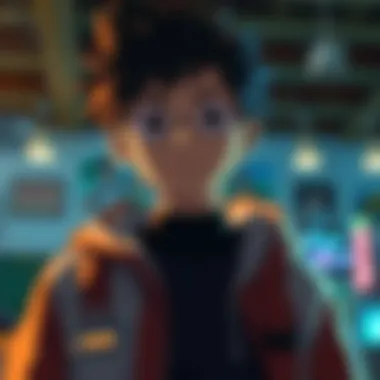

For further exploration on the themes of ethics in heroism, you might find this analysis insightful: source.
Engaging with these nuanced challenges makes the journey of becoming a hero not just about strength, but also about growth, understanding, and navigating the intricate balance between power and responsibility.
Significant Events in the Hero Course
The Hero Course is not just an educational pathway; it's a crucible where students are shaped into vigilant protectors of society. Within the narrative of My Hero Academia, significant events act as pivotal points that define the development of the course and its students. Each event serves a unique purpose, providing valuable lessons, fostering camaraderie, and sometimes exposing harsh realities that future heroes must confront.
Notable Training Events and Contests
Training events and contests in the Hero Course aren't merely for show; they are essential building blocks for character development and skill enhancement. For instance, the U.A. Sports Festival is one such event that stands out. This spectacle, while showcasing individual talents, also pits students against each other, fostering a spirit of competition.
- Teamwork and Strategy: In these contests, students learn not just to rely on their quirks but also to collaborate effectively. For example, when Deku teams up with Todoroki, we see how diverse abilities can complement each other for a more formidable outcome.
- Personal Growth: Each contest is tailored to push the limits of the characters. Take Bakugo's explosive personality, which, through competition, evolves into a more strategic approach. The pressures of these events often bring out hidden talents or flaws, making them key to character arcs.
One must understand that these contests serve as more than just hurdles; they reveal priorities and insecurities among the contestants.
"Competition is not just about winning but rather about finding one's place and who you are in the grand scheme of things."
Impact of Professional Internships
Professional internships provide students with an opportunity to step out of the classroom and into the real-world chaos of hero work. These internships are pivotal, bridging the gap between theoretical knowledge and practical application. By engaging with established heroes, students experience firsthand the complexities and responsibilities that come with their role.
- Real-World Applications: Internships like those with heroes such as All Might or Endeavor expose students to situations where they must think on their feet. Each internship experience shapes their perspective on heroism. It’s one thing to study heroes in class; it's another to assist them in real-life scenarios, often under spectacularly high stakes.
- Understanding Ethics: These experiences also highlight ethical dilemmas that heroes face daily. Students often grapple with questions about justice, sacrifice, and the greater good. Learning from the mistakes of professional heroes, they develop a deeper understanding of their responsibilities.
In summary, significant events, contests, and internships within the Hero Course serve multiple functions. They not only challenge students but also prepare them for the unpredictable life ahead as heroes. These events hook the audience, showcasing profound character development while simultaneously reflecting broader themes of responsibility and growth.
Further readings can be found at Wikipedia's Hero Academia Page, exploring deeper insights into character growth and event significance within the series.
The Evolution of Hero Academia's Hero Course
The Hero Course in My Hero Academia has undergone remarkable transformations since the inception of the anime. Its evolution mirrors not just the development of individual characters, but also the changing landscape of hero society itself. This section delves into how the course has adapted over the seasons to meet the needs of its students and reflects the broader themes of growth, responsibility, and the ever-complex nature of heroism.
Changes Over Seasons
Over the years, the Hero Course has seen several key changes that speak volumes about its adaptability. Each season introduces new challenges and content that both test the students and enrich their training. For instance:
- Increased Emphasis on Teamwork: As the students progress, the curriculum shifts towards cooperative exercises. The Final Exam Arc shifts focus from individual prowess to group dynamics, illustrating that heroes often rely on one another during high-stakes scenarios.
- Incorporation of Real-World Scenarios: With each arc, the depiction of villains becomes more nuanced. This is particularly visible in the Shie Hassaikai Arc, where real-world stakes and emotional implications are injected into the training sessions, preparing the students for life's harsh realities.
- Diverse Training Methods: Various training adaptations introduced by Pro Heroes not only enhance skills but also allow students to discover their identity as future pros. The Unforeseen Simulation Joint showcases how strategic preparation is equally as critical as physical training.
These changes represent more than a mere curriculum shift; they reflect the evolution of hero responsibility in response to societal demands. The Hero Course has morphed into a framework that does not only teach combat skills but also highlights the importance of ethics, teamwork, and real-life applicability.
Future Directions for the Course
Looking ahead, the Hero Course is set to evolve even further. Speculations abound regarding what may come next as the series progresses:
- Adaptation to New Threats: The introduction of new villains and threats suggests that future training will need to continuously adapt. Focus could shift towards countering advanced quirks and unconventional combat tactics.
- Broader Global Influences: As seen with events like the joint training exercise with other schools, global perspectives on heroism are likely to influence the curriculum. Future courses might incorporate strategies from heroes worldwide, enhancing collaborative learning.
- Focus on Mental and Emotional Health: The psychological toll of being a hero is becoming more apparent, especially post-traumatic stress after battles. It's likely that upcoming iterations of the Hero Course will include mental health training or workshops, providing students with tools to handle their emotional well-being.
"As heroes, we must constantly evolve, not just in our abilities but also in our understanding of the world around us." - Pro Hero Endeavor
In this ever-evolving landscape, the Hero Course stands as a testament to what it means to be a hero. It encapsulates the essence of lifelong learning and the urgent need to adapt in the face of adversity. Such changes demonstrate a proactive approach, ensuring that future heroes are well-equipped not just to fight, but to think critically about their roles in society.
Comparative Analysis with Other Hero Programs
When delving into the ethos behind the Hero Course in My Hero Academia, it's enlightening to step outside its own narrative and engage in a comparative analysis with other hero programs within the anime landscape. This exploration may shine a light on the unique attributes of U.A. High School's Hero Course while offering a broader context to understand the hero-training principles portrayed across different series. Understanding these comparisons isn’t just academic; they provide critical insight into the values, challenges, and evolution of the hero archetype.
Other Academy Models in Anime
In the diverse universe of anime, several academy-style programs center around heroes, each with its own curriculum, challenges, and societal implications. Key examples include:
- The Crescent Moon Kingdom from The Heroic Legend of Arslan:
- Hero Academia (Wonderland) in Little Witch Academia:
- The Academy in Assassination Classroom:
- Focuses on the balance between combat skills and diplomatic strategies, showcasing how heroes should engage with society beyond fighting.
- Here, the emphasis lies more on magic and personal growth, diverging from combat specialization and highlighting creativity alongside heroism.
- While not strictly about heroism, this program teaches students to confront moral dilemmas and the consequences of their actions, offering a layered look at responsibility.
These programs, albeit varied, share a common thread of developing characters into agents of change, albeit through different lenses.
Lessons Learned from Other Series
Reflecting on other series uncovers valuable lessons that can inform the narrative of U.A. High School's Hero Course. Such analysis reveals shared motifs while also outlining distinct pedagogies that rise due to cultural contexts:
- Mentorship Dynamics:
- Ethical Training:
- The Idea of Failure:
- Often, the student-mentor relationship seen in My Hero Academia might echo the more unconventional partnerships depicted in Naruto, where growth emerges through shared experiences and the forging of bonds.
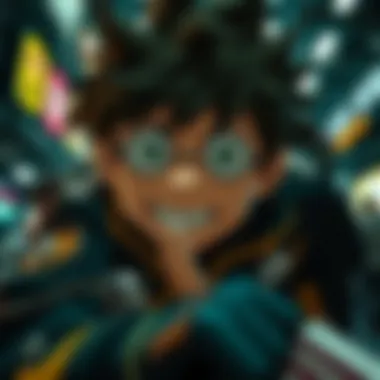

- Programs in series like Code Geass introduce ethical complexities that go beyond mere physical training, suggesting that real heroism involves grappling with moral judgments.
- Many other series, particularly Attack on Titan, depict failure as a catalyst for growth. In contrast, while U.A. presents challenges, acknowledging failure in a constructive light remains vital for deeper character development.
“In understanding what it means to train as a hero, we often uncover that the fundamental traits of bravery, heart, and resilience transcend the scope of any one storyline.”
Thus, the comparative analysis functions as a mirror, reflecting both the strengths and gaps in the Hero Course of My Hero Academia. Gleaning from these other programs invites discussions about how this training shapes identity and responsibility within the larger narrative.
In essence, heroes arise not solely from their powers but from the experiences and lessons they garner throughout their journeys. A thorough understanding of these elements enriches the reception of heroism depicted in My Hero Academia, continually challenging our perceptions and inviting exploration into what truly makes a hero.
Fan Perspectives and Community Reception
Understanding fan perspectives and community reception is pivotal to grasping the full impact of the Hero Course within My Hero Academia. The series thrives not just on its plot and characters, but also on how its audience perceives and engages in discussions around these elements. Fans are not mere spectators; they are an integral force that shapes the narrative, imbuing it with personal meanings and insights that often transcend the screen.
The Hero Course resonates with many because of its deep-rooted themes of growth, sacrifice, and morality. By sharing their interpretations, fans enrich the narrative. They often discuss how characters evolve through challenges, and this discourse can lead to richer understandings of character motivations and future developments. Beyond that, fans connect over mutual love for the series, creating vibrant communities that foster dialogue and sharing of theories.
Community Discussions on Character Growth
In forums and social media platforms, conversations about character growth appear to be a recurring theme. For example, the arcs of Izuku Midoriya and Shoto Todoroki stand out in community discourse, with fans dissecting pivotal moments that define their growth.
- Character Evolution: Midoriya progresses from a powerless boy to a symbol of tenacity. The fans take pleasure in analyzing how his determination mirrors their own daily struggles, creating a relatable figure that embodies resilience.
- Todoroki's Duality: Similarly, the discussions around Shoto often revolve around his internal conflict stemming from family expectations. Fans appreciate how this reflects real-world issues, urging them to share personal stories of overcoming familial pressure.
These discussions often lead to rich interpretations and theories about how the characters will continue to develop, making each episode or chapter an opportunity for further debate. Such dialogue forms a connective tissue among the audience, prompting them to not only reflect but also engage with the narrative in multifaceted ways.
The Role of Fan Theories
Fan theories function as a testament to how invested the community is in My Hero Academia. They are often born out of simple observations or lingering questions regarding future plot lines, character backstories, or hidden meanings within episodes. The act of theorizing brings fans together, fostering a sense of community.
- Engagement and Speculation: Some fans postulate on the potentiality of certain characters, predicting developments as the series progresses. For example, theories about the true nature of All For One or the significance of quirks like One For All keep fans buzzing. The thrill of discussing these theories adds layers to their viewing experience, as they eagerly await confirmation or refutation in subsequent episodes.
- Creativity in Fan Theories: Fans also express their theories through fan art, fan fiction, or animated shorts. These creative outlets serve as a profound way to connect emotionally with the text, as they create narratives that explore possibilities that the original work might not cover. This enthusiasm reflects the community's desire to see its favorite characters in various lights and scenarios.
As these theories circulate, they become a part of the greater My Hero Academia lore, feeding back into the official narrative but also expanding it beyond the confines of the original story. Hence, the interplay between creators and the audience not only sustains the series but also continuously shapes its evolution, leading to a thriving ecosystem of creativity and engagement that fuels My Hero Academia into new heights.
Impact of the Hero Course on Global Fanbase
The Hero Course from My Hero Academia stands as a significant pillar not just within the anime itself, but also in how it resonates with fans globally. Its influence is palpable, igniting discussions and forming a community around its core themes. The complexities of heroism presented in this series attract a wide audience, giving insight into various cultural perspectives while maintaining relatability.
Transcending Cultural Boundaries
The global nature of My Hero Academia is an impressive feat, breaking down the barriers that often confine stories to their cultural origins. The Hero Course delves into universal themes like friendship, perseverance, and morality, connecting with a broad audience. Fans from diverse backgrounds find familiarity in the struggles and aspirations of students like Izuku Midoriya and Ochaco Uraraka. These characters mirror real-life challenges many face, fostering empathy and understanding.
Additionally, the character designs and quirks draw inspiration from various cultural elements, making them feel both unique and accessible. This amalgamation creates a rich narrative that resonates well across different geographies, leading to extensive fan theories and discussions on platforms like reddit.com. The result is a melting pot of ideas where fans contribute their interpretations and experiences, enriching the overall story.
"My Hero Academia illustrates that heroism knows no cultural bounds; it is a universal aspiration."
Influencing Other Media
The impact of the Hero Course stretches beyond the confines of anime into the broader media landscape. Numerous shows, movies, and even video games have drawn inspiration from the narrative structure and character development of My Hero Academia.
- Anime Adaptations: Several anime have adopted similar themes of mentorship and heroism, aiming to capture what makes My Hero Academia special. These newer titles often pay homage to the complexity of character arcs and moral dilemmas faced within the Hero Course.
- Western Media: The influence has traveled west as well, with American comic books subtly incorporating themes of hero training and character growth. The rise of superhero films often mirrors the struggles for acceptance and responsibility found in the journeys of My Hero Academia's students.
While specific titles may easily come to mind, it's worth noting how the overall ethos of striving for greatness—imperfect heroes learning through challenges—has become a foundational narrative element in many newly developed stories.
The Hero Course's impact has also moved into educational territories, inspiring discussions about ethics in professions like law enforcement and military training programs. This highlights how the series can serve as a framework for modern narratives, bridging entertainment with meaningful societal conversations.
In closing, the Hero Course is not just a fictional construct but a compelling narrative that inspires both fandom and creativity in media everywhere. Its ability to touch hearts and minds proves that heroism, in whatever form it may take, is a story worth telling—a theme that resonates across cultures and recreational formats.
Closure
The Hero Course in My Hero Academia embodies much more than a mere training program for aspiring heroes. It is a pivotal element that encapsulates the series’ core themes of growth, perseverance, and ethical considerations in the world of heroism. Within this course, students wrestle not only with the physical demands of their Quirks but also with the moral dilemmas that arise in the responsibilities tied to their powers. This duality of training defines their journey towards becoming true heroes.
Reflections on the Hero Course's Significance
The significance of the Hero Course extends into various dimensions of the narrative and character development. It acts as a crucible for the students, forging them through rigorous training regimes, intense competitions, and substantive mentoring relationships. For many characters, particularly Izuku Midoriya, the Hero Course serves as a pathway to self-discovery. The intense trials reflect their personal struggles, fostering resilience and camaraderie. This journey resonates deeply with fans, engaging them in the characters’ growth that parallels their own life challenges.
Moreover, the Hero Course helps establish a unique perspective on heroism itself. It isn’t just about possessing power; it’s about using that power wisely, honoring the ideals of justice, and protecting those unable to protect themselves. Through the missteps and mistakes made within the Hero Course, viewers can observe the evolution of what it means to be a hero in a complex world, greatly underscoring the importance of moral integrity and responsibility.
Final Thoughts on Aspirational Themes
Aspirational themes are intricately woven into the fabric of the Hero Course, appealing to a broad spectrum of audience sensitivities. The continuous journey of growth—characterized by the determination to enhance oneself and overcome obstacles—offers a relatable narrative for viewers of all ages. The stories of students battling against adversity serve as a monument to the human spirit, regardless of one’s abilities.
At its core, My Hero Academia champions the message that heroism is not an innate trait but a skill developed through hard work and ethical reflection. Fans witness characters who falter but rise again; they learn about the significance of mentorship, the value of teamwork, and the critical decisions heroes must confront.
In essence, the Hero Course is not just a backdrop for the series, but a profound commentary on the nature of heroism itself—reminding viewers that each of us can embody heroism in our daily lives, whether big or small.
"Being a hero isn’t just about having power. It’s about how you choose to use it in the world. "
This series and its exploration of the Hero Course challenge us to think, reflect, and inspire.
Resources for Further Reading
- Wikipedia on My Hero Academia: en.wikipedia.org
- Understanding hero narratives: britannica.com
- Fan discussions on Reddit: reddit.com/r/BokuNoHeroAcademia
